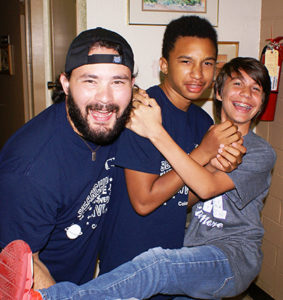SAN ANTONIO—The more Baptist Temple in San Antonio involves itself in its community, the more the church becomes aware of opportunities to bring about change.
Baptist Temple is located in a low-income neighborhood, and for years, it has provided programs to assist its community. But Pastor Jorge Zayasbazan notes some of those have been temporary solutions, and now the church wants to do more.
Reaching the community

Zayasbazan arrived at Baptist Temple in 2009, when the church was looking for a missions-minded pastor. Since then, the church has tried and reshaped various ministries to help people in the community.
One of the first efforts involved bringing a truck of food to the church once a month so people could get groceries, Zayasbazan said.
“It might have not been the most efficient, and it caused some problems, but we were feeding the hungry,” he said.
The church “is in the business of turning people’s lives to Jesus,” Zayasbazan said. That definitely means being a light in an area that has been excluded and is challenged by poverty, he insisted.
“We want to break the cycle of poverty,” he said.
Church leaders grew to realize the food truck was just “a maintenance ministry” that failed to address root causes, he acknowledged. The issues of poverty go deeper than not having access to food, and the solutions to poverty have to go deeper, as well, they concluded.
In 2012, the Pew Research Center ranked San Antonio as the most economically segregated of the country’s 30 largest metro areas.
Sign up for our weekly edition and get all our headlines in your inbox on Thursdays
The effects of what that study revealed still can be seen in the city, which segregated populations for decades and cared only for the areas in which Anglos lived, Zayasbazan said. Property deeds stipulated the only people who could use or occupy a “lot, site, structure or dwelling” were members of the “Caucasian or White Race.”
Although the most blatant forms of discrimination have been eliminated, disparity between sections of the city persists, Zayasbazan indicated.
Seeking to transform community
Baptist Temple ministers to immediate needs of people in its neighborhood through its food pantry, community garden, thrift store and a free community meal on Wednesdays.
But most recently, the church also decided to develop a ministry to achieve long-term goals of community transformation.
Zayasbazan views education as key for people to have better access to resources and to help them achieve their own goals.
Where resources already are available, the church can help the community envision the future its residents want, set goals and put those resources to work to achieve their goals, he explained.
If the resources are not present in the community, the church can help residents see what they need and help create those resources, he added.
“What we need is to help them get a picture of themselves as successful people,” Zayasbazan said.
Bridge between church and community
Baptist Temple purchased a house next door to its facility, and Baptist University of the Américas students who live there will receive free food and lodging courtesy of the church while they minister to the surrounding community.
Other churches helped with the project by providing funding for the reparations of the house and buying appliances.

Angello Sanchez, a student at BUA, has been an important part of forming this ministry. Sanchez, and three other BUA students will live at the house and help the church learn more about what the community needs.
In the community, the BUA students will help public school students with their education and mentor them toward a future that breaks the cycle of generational poverty.
While BUA students can relate to the challenges people in the community face, they also can help the neighborhood residents see what could be achieved through education.
“We need to help the people here take advantage of the opportunities that are here,” Zayasbazan said.
Sanchez and the other three BUA students will serve as the bridge between the church and the community, Zayasbazan explained. They will help the congregation discover better ways to serve the community, and they will help enlist volunteers and raise funds.
‘What God has called us to do’
Money is the least of the challenges for the church, Zayasbazan insists. The important part is not how the church pays for the ministry it does; the important part is doing the ministry, he asserted.
“God is the one paying for everything,” he added.
Repairs continue on the house, and Sanchez stays there a few nights a week while he helps with some of those renovations.
One of the goals for Baptist Temple’s new ministry is to help students in the neighborhood graduate from high school and enter college. Higher levels of education will allow young people from the community to increase their earning potential, Zayasbazan noted.
Zayasbazan’s own experience encourages him to see education as a gateway out of poverty, and he hopes BUA students can model that for the children in the community.
While the number of undereducated adults in the neighborhood remains high, the church wants to help bring about change, he insisted.
“This is more than we can do alone,” Zayasbazan said. “But this is what God has called us to do.”
















We seek to connect God’s story and God’s people around the world. To learn more about God’s story, click here.
Send comments and feedback to Eric Black, our editor. For comments to be published, please specify “letter to the editor.” Maximum length for publication is 300 words.